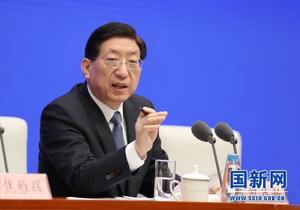 Zeng Yixin, vice-minister of the National Health Commission. (PHOTO / SCIO.GOV.CN)
Zeng Yixin, vice-minister of the National Health Commission. (PHOTO / SCIO.GOV.CN)
More researches are needed to determine how long the COVID-19 vaccines could be effective as the novel coronavirus was discovered just a year ago, a Chinese official said on Saturday.
READ MORE: COVID-19: China to vaccinate 'key groups' over winter, spring
Although it is still too early to conclude that Chinese COVID-19 vaccines can offer life-long immunity or be effective for five or 10 years like many viral vaccines, there's little doubt that Chinese COVID-19 vaccines can offer effective protection for at least six months based on existing evidence, said Zeng Yixin, vice-minister of the National Health Commission.
Before we establish herd immunity, strong epidemic prevention and control efforts are still required to protect people's safety.
Zeng Yixin, vice-minister, National Health Commission
The vaccination experiments on monkeys since February have shown the vaccines are still effective after nine months and the volunteers who have received the vaccine trials since March still have antibody, he said at a news conference organized by the State Council Information Office.
Moreover, based on surveys of more than 400 recovered patients at a hospital in Shenzhen, Guangdong province, some patients have antibodies more than 10 months after recovery, he said.
As China is starting massive vaccination among people deemed at high risk of contracting the novel coronavirus nationwide, Zeng suggested that people who have received vaccination continue with personal protection measures, such as wearing masks, social distancing, and washing hands frequently, as no vaccine could be 100 percent effective.
"Before we establish herd immunity, strong epidemic prevention and control efforts are still required to protect people's safety", he added.
Side effects of vaccines observed in China are less severe than in other countries, which usually includes headache and fever, redness and lump in vaccination point, as well as cough, loss of appetite, vomit and diarrhea, a health official said
Authorities are also keeping a close eye on possible side effects. Jiao Yahui, an official with the commission's medical administration and supervision department, said vaccination sites across the country should meet the strict requirements for vaccination and medical treatment to cope with possible side effects.
She said the side effects observed in China are less severe than other countries, which usually includes headache and fever, redness and lump in vaccination point, as well as cough, loss of appetite, vomit and diarrhea.
People should report their health conditions, including underlying disease and history of allergy to medical workers before they are vaccinated and they should stay at the vaccination sites for about 30 minutes for observation after vaccination, she added.
Govt vows prompt release of info
China will promptly release information regarding the status of its COVID-19 vaccine candidates, five of which are in phase three clinical trials overseas, said Zheng Zhongwei, director of the Development Center for Medical Science and Technology of the National Health Commission.
Currently, some of the vaccine candidates in late stage human trials have enlisted enough recipients to meet the middle stage progress of the trials. Vaccine developers are also keeping the National Medical Products Administration updated on their status, he said.
After the trials are completed, if the vaccine's performance meets the required standards, the administration will approve it for market use. The roll out of vaccines will be swift because China is prepared to mass produce them, he said.
ALSO READ: China's COVID-19 vaccine capacity to reach 610 million
According to the World Health Organization, China is one of the world leaders in COVID-19 development both in terms of the total number of vaccines in clinical trials and the number of vaccines in late-stage human trials, Zheng said.
China's five vaccine candidates in phase three clinical trials are three inactivated vaccines, an adenovirus vector vaccine and a recombinant protein vaccine.
Due to China's strong prevention and control measures against COVID-19, the country is no longer suitable to conduct phase three clinical trials, hence these trials must be done overseas, he added.
However, the countries where Chinese vaccine candidates are being tested are not places where the COVID-19 pandemic is the most serious, therefore it may take more time to enroll the necessary number of volunteers for the trials, he said.
In regards to the price of the vaccine, Zheng said this will depend on the company. The final price will be determined by its cost and is subject to change as production ramps up.


